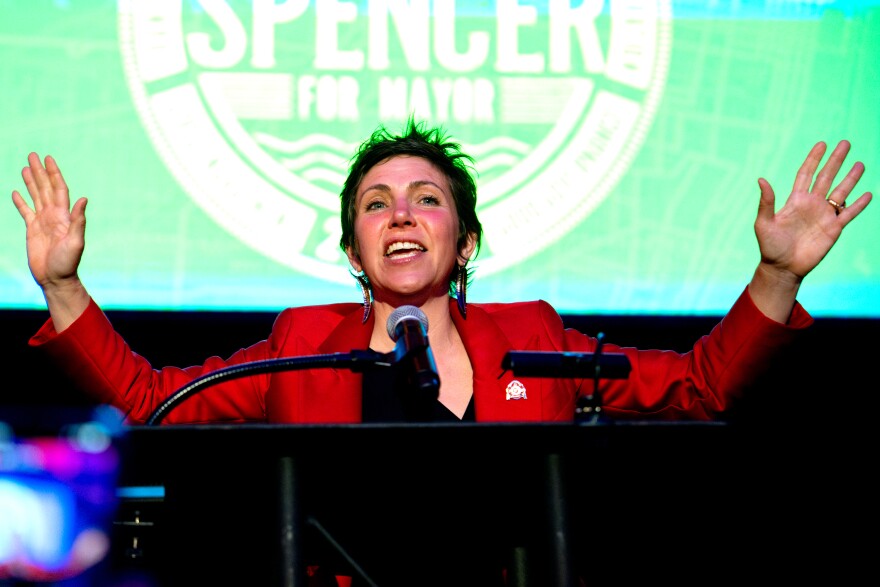Tuesday presented a rare occasion when St. Louis voters decisively chose change but also went with the status quo.
Voters ousted St. Louis Mayor Tishaura Jones and St. Louis Comptroller Darlene Green, replacing them with Alderwoman Cara Spencer and former state Rep. Donna Baringer, respectively. They also chose three new members of the St. Louis Public Schools Board, declining to give another term to board President Toni Cousins.
But city residents decided to keep incumbent members of the Board of Aldermen. And St. Louis County voters decisively rejected a ballot measure to give the county council authority to fire department leaders and the county counselor.
Here are five takeaways from Tuesday’s municipal elections:

Spencer crushed Jones in high-turnout wards
Spencer’s win on Tuesday was hardly a surprise. The 8th Ward alderwoman easily won in March, and it would have been a massive reversal of fortune had she not prevailed in the general election.
Her roadmap was fairly similar to her primary win: Spencer racked up huge margins of victory in high-turnout wards in south St. Louis, including areas where Jones performed well in 2021. She edged Jones in the 3rd and 7th wards, which have substantial populations of Black residents.
Spencer’s 28-percentage point win is still impressive by recent precedent. In the past three mayoral elections, the victor won by 10 percentage points or less. A blowout win like Spencer’s hasn’t happened since then-Mayor Francis Slay trounced Irene Smith in 2005 and 2009.
“We ran a very positive and constructive campaign really focused on basic city services, but really thinking bigger about our city,” Spencer said during an appearance on Wednesday’s St. Louis on the Air.
Jones won Black-majority wards, but not by as much as Green
Jones ended up winning five out of the city’s 14 wards, all of which have Black-majority populations. During her concession speech on Tuesday, Jones cited bolstered investment in north St. Louis as one of her points of pride for her administration.
“We cannot afford to go back to decades of neglect for north St Louis, leaving half of our city to fail,” Jones said.
But not only did the wards Jones won have much lower turnout than majority-white or integrated wards, she didn’t win them by as much as St. Louis Comptroller Darlene Green — the other Black incumbent who lost reelection on Tuesday.
And Jones’ wins in the 10th and 14th wards were fairly narrow, which showed both underperformance from the mayor and a much better outcome for Spencer in African American parts of the city.
During her St. Louis on the Air appearance, Spencer cited relationships she built with north St. Louis-based elected officials, business owners and neighborhood associations while she was campaigning for mayor.
“Hopefully we can really build from that to better serve our north city communities, which as we all know are in such bad need of support,” Spencer said.
Loading...
Spencer and the Board of Aldermen

St. Louisans returned several members of the Board of Aldermen to office on Tuesday, including some who have close political or personal relationships with Jones.
And while the dividing lines on the board often shift depending on the issue, Spencer’s success as mayor could depend on her ability to work with some of Jones’ traditional allies. She’ll also need to avoid some of the pitfalls that other white mayors like Slay and Lyda Krewson encountered when working with Black aldermen.
St. Louis Alderman Rasheen Aldridge, an ally of Jones who wasn’t up for election on Tuesday, said it’s not lost on him that there is no longer an African American member of the Board of Estimate and Apportionment — which makes key financial decisions for the city.
“As the new composition of the Board of Estimate & Apportionment takes shape, I want to be clear: Representation matters,” Aldridge said. “As the Board of Estimate & Apportionment becomes all white, and as the only Black man elected at the Board of Aldermen, I feel a renewed sense of purpose. I intend to use my voice and my platform to speak unapologetically for my community.”

Baringer could become city’s new power broker
When Baringer takes over for Green on Tuesday, she’ll have an opportunity to tilt the balance of power in city government.
Since she’ll be a member of the Board of Estimate and Apportionment, Baringer will cast the tie-breaking vote if there’s disagreement between Spencer and St. Louis Board of Aldermen President Megan Green.
Darlene Green purposefully declined to permanently align with either the mayor or the Board of Aldermen president.
As both an alderwoman and a state lawmaker, Baringer charted a more moderate to conservative record than either Darlene Green or Megan Green.

Page gets a major political victory
Proposition B was not only a major escalation in the battle between the county executive’s office and the county council, it was a barometer on Page’s political future.
Had Proposition B passed, it could have called into question Page’s reelection viability — especially since his political action committee spent money to try to defeat the measure. But St. Louis County voters decisively defeated Proposition B, which Page celebrated on Wednesday during a press conference in Clayton.
Page emphasized during his remarks that the defeat of Proposition B was about more than politics — it prevented county government from teetering into chaos.
“Voters agreed it was bad for the county. It was bad for the operations of county government,” Page said. “And it's really time to get back to work on the issues that have a real impact on the county residents.”
Still, Page isn’t out of the woods yet when it comes to his relationship with the county council. Tuesday’s vote doesn’t change the reality that six out of seven members are antagonistic to him — meaning they’ll still have a lot of power to stall his agenda on issues of disagreement.









